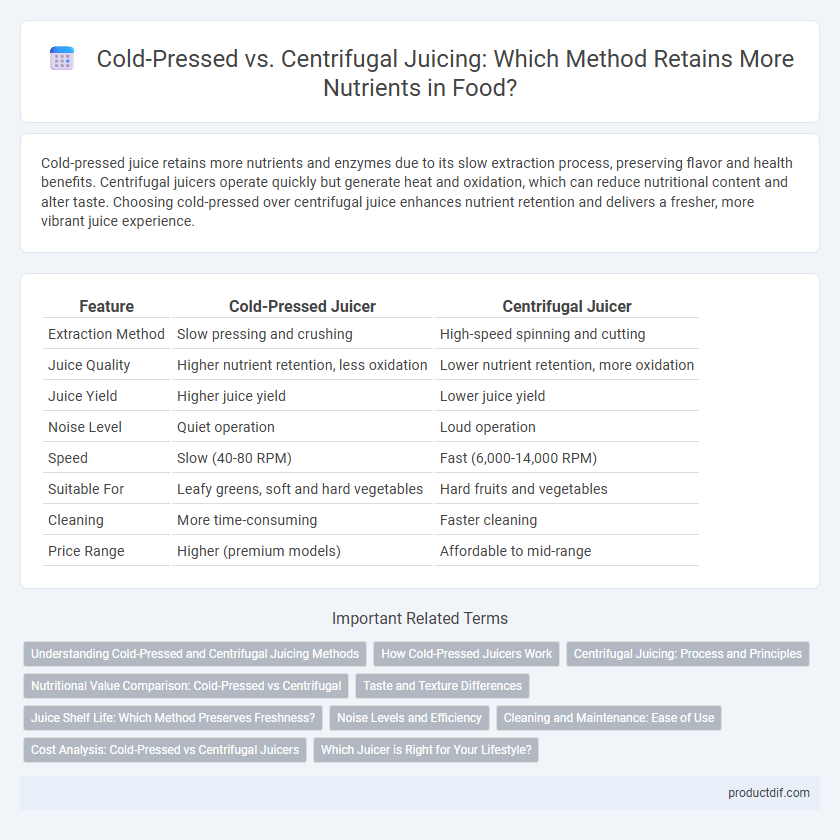Cold-pressed juice retains more nutrients and enzymes due to its slow extraction process, preserving flavor and health benefits. Centrifugal juicers operate quickly but generate heat and oxidation, which can reduce nutritional content and alter taste. Choosing cold-pressed over centrifugal juice enhances nutrient retention and delivers a fresher, more vibrant juice experience.
Table of Comparison
| Feature | Cold-Pressed Juicer | Centrifugal Juicer |
|---|---|---|
| Extraction Method | Slow pressing and crushing | High-speed spinning and cutting |
| Juice Quality | Higher nutrient retention, less oxidation | Lower nutrient retention, more oxidation |
| Juice Yield | Higher juice yield | Lower juice yield |
| Noise Level | Quiet operation | Loud operation |
| Speed | Slow (40-80 RPM) | Fast (6,000-14,000 RPM) |
| Suitable For | Leafy greens, soft and hard vegetables | Hard fruits and vegetables |
| Cleaning | More time-consuming | Faster cleaning |
| Price Range | Higher (premium models) | Affordable to mid-range |
Understanding Cold-Pressed and Centrifugal Juicing Methods
Cold-pressed juicing uses a hydraulic press to extract juice by slowly crushing fruits and vegetables, preserving nutrients and enzymes with minimal heat and oxidation. Centrifugal juicing involves a high-speed spinning blade that quickly grinds produce, which can introduce heat and air, potentially reducing nutritional content and juice shelf life. Understanding these methods highlights cold-pressed juice's superior nutrient retention and centrifugal juice's faster processing time.
How Cold-Pressed Juicers Work
Cold-pressed juicers operate using a slow, hydraulic press that gently crushes fruits and vegetables to extract juice, preserving nutrients and enzymes more effectively than centrifugal methods. This mechanical process minimizes heat generation and oxidation, resulting in higher quality juice with enhanced flavor and longer shelf life. The technology relies on an auger or gear system to slowly compress produce, distinguishing it from the high-speed spinning blades of centrifugal juicers.
Centrifugal Juicing: Process and Principles
Centrifugal juicing operates by rapidly spinning a metal blade against a mesh filter to extract juice from fruits and vegetables through high-speed centrifugal force. This process efficiently separates juice from pulp, delivering quick results ideal for harder produce like carrots and apples. While heat generated during extraction may reduce nutrient content, centrifugal juicers offer convenient and time-saving operation for everyday juicing needs.
Nutritional Value Comparison: Cold-Pressed vs Centrifugal
Cold-pressed juicers use slow hydraulic pressure to extract juice, preserving more vitamins, enzymes, and antioxidants compared to centrifugal juicers that rely on high-speed blades generating heat and oxidation. Nutritional analysis shows cold-pressed juice retains higher levels of vitamin C, folate, and polyphenols, contributing to better overall health benefits. Studies indicate that centrifugal juicing results in faster nutrient degradation and lower antioxidant activity due to exposure to heat and air during extraction.
Taste and Texture Differences
Cold-pressed juices retain more nutrients and exhibit a richer, fresher flavor with a thicker, pulpier texture due to the slow extraction process. Centrifugal juicers generate heat and oxidation, resulting in a lighter, less intense taste and a thinner, more watery texture. Taste preferences often favor cold-pressed juice for its vibrant, complex flavors and smooth mouthfeel.
Juice Shelf Life: Which Method Preserves Freshness?
Cold-pressed juice retains freshness longer than centrifugal juice due to its minimal heat exposure, preserving more nutrients and enzymes that slow oxidation. Cold-pressed juices typically have a shelf life of 3 to 5 days when refrigerated, whereas centrifugal juices often spoil within 24 to 48 hours. The reduced oxidation during cold pressing results in better flavor stability and nutrient retention, making it the preferred method for extended juice freshness.
Noise Levels and Efficiency
Cold-pressed juicers operate quietly due to their slow masticating process, producing less noise compared to centrifugal juicers, which use high-speed spinning blades that generate significant sound. In terms of efficiency, cold-pressed juicers extract more juice and retain higher nutrient levels by gently crushing produce, while centrifugal juicers provide faster juice output but often sacrifice quality and nutrient preservation. Noise level comparisons show cold-pressed models typically produce under 60 decibels, whereas centrifugal juicers frequently exceed 80 decibels during operation.
Cleaning and Maintenance: Ease of Use
Cold-pressed juicers require more thorough cleaning due to their intricate parts and slower juice extraction process, often needing a brush to remove pulp residues. Centrifugal juicers typically offer easier maintenance with fewer components and faster cleaning time, as the high-speed spinning pushes pulp into a separate container. For frequent users, centrifugal models provide greater convenience and less downtime, making them ideal for quick, everyday juicing.
Cost Analysis: Cold-Pressed vs Centrifugal Juicers
Cold-pressed juicers typically have a higher upfront cost, ranging from $200 to $500, compared to centrifugal juicers, which usually cost between $50 and $150. Maintenance expenses for cold-pressed juicers can be lower due to fewer moving parts, whereas centrifugal juicers may require more frequent replacements of blades and filters. Over time, cold-pressed juicers offer better juice yield and nutrient retention, potentially providing greater value despite the initial investment.
Which Juicer is Right for Your Lifestyle?
Cold-pressed juicers extract juice slowly using hydraulic pressure, preserving more nutrients and enzymes, making them ideal for health-conscious individuals seeking maximum juice quality. Centrifugal juicers operate quickly with high-speed spinning blades, offering convenience and speed, perfect for busy lifestyles where time is limited. Choosing between cold-pressed and centrifugal juicers depends on whether you prioritize nutrient retention and juice clarity or quick preparation and ease of use.
Cold-Pressed vs Centrifugal Infographic

 productdif.com
productdif.com